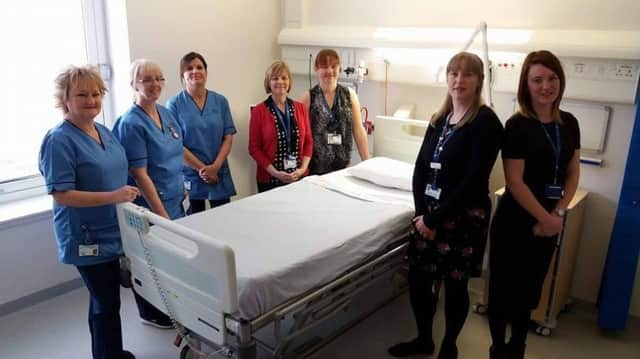Team work at the heart of dementia project


Not only has NHS Forth Valley’s way of working won a national care award and been shortlisted for another, it has also attracted interest from other health boards.
The project’s main aim was to cut down the number of times patients with dementia were transferred to different wards, particularly late at night.
Advertisement
Hide AdAdvertisement
Hide AdAnd in just 18 months, the collaborative approach has produced some impressive results for Forth Valley Royal Hospital.
Nicola Wood, team leader of liaison psychiatry for older people who led the project said: “We had evidence which showed that transferring people with dementia late at night could increase the risk of delirium and the impact this had on people’s whole hospital experience.
“Back in November 2015, I looked at patients journeys in the acute setting and it wasn’t great.
“It showed almost half of patient transfers took place at 8pm at night, and ten per cent after midnight.
Advertisement
Hide AdAdvertisement
Hide Ad“We also found that a third had multi moves to different specialised wards during their stay in hospital.
“Through our dementia champion Yvonne Cairns, we are also in touch with the local carers centre.
“Carers and patients were also aware of this problem and they were not feeling great about it, and hospital staff were also frustrated.”
Teams involved with patient flow, assessment and psychiatry, pharmacy and transfer started to work together to make people’s journeys better.
Advertisement
Hide AdAdvertisement
Hide AdThey raised awareness of the impact on patients of multiple or late-night switches between inpatient wards.
Earlier discharges were also looked at and efforts were made to make beds available earlier in the day.
Teams aimed to be more organised the day before to get patients home by lunchtime instead of later in the afternoon.
And just 18 months later, the results speak for themselves.
Now, 90 per cent of transfers happen before 8pm, a rise from the 2015 figure of 52 per cent.
Advertisement
Hide AdAdvertisement
Hide AdTransfers after midnight are also sitting around zero except for when there is a real clinical reason to move a patient.
Also only two per cent of patients are now moved multiple times, a vast improvement on the 33 per cent recorded in 2015.
Nicola said: “The carers centre now report a positive experience.
“Staff are also happier and feel more empowered.
“This has been running well now for nine or ten months and showing sustained improvement.
Advertisement
Hide AdAdvertisement
Hide Ad“We have also had contact from other health boards who have heard about this.
“I sit on a national group of dementia nurses so we hope to share recommendations about how this can be replicated in other areas. One of the main things we are proud of is that this involved working with different teams, it was a collaborated project.
“We were linking in with different people with different backgrounds and specialisms, but working for shared goals.”
Last month, the project entitled Improving the journey for people with dementia in the acute hospital setting; a collaborative approach, won the NHS Scotland Event 2017 for effective quality of care.
Advertisement
Hide AdAdvertisement
Hide AdThe collaborative way of working has also been shortlisted for Alzheimer Scotland national dementia awards.
Rigorously judged by a panel of senior health, social service and third sector professionals alongside people with dementia and carers, the Awards celebrate creative approaches, innovation and best practice in all aspects of information, advice, care and support for people living with dementia.
Henry Simmons, chief executive of Alzheimer Scotland and chairman of Scotland’s Dementia Awards said: “Scotland’s Dementia Awards celebrate the work of both professionals and community groups who are committed to helping people with dementia and their families. As well as showcasing creativity and innovation, the awards really celebrate good ideas, meaningful partnerships and acknowledge the people and colleagues working together to help us improve the day to day lives of people living with dementia across our communities, from the Scottish Borders to the Highlands and Islands.
“All of our finalists this year are extremely deserving for their commitment in supporting people living with dementia and their families and we look forward to saying a big thank you to all our finalists and winners on the day.”
Winners will be revealed on World Alzheimer’s Day, September 21.